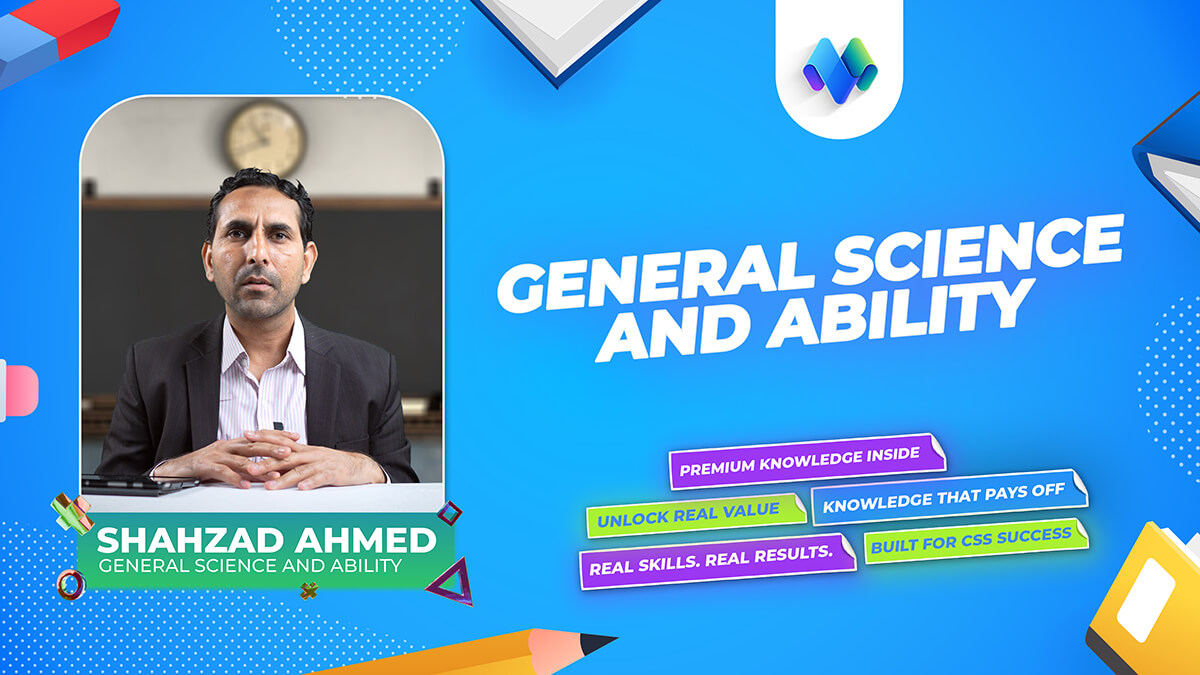Overview
Part-I: General Science (60 Marks)
- Physical Sciences
- Constituents and Structure: Universe, Galaxy, Light Year, Solar System, Sun, Earth, Astronomical System of Units.
- Process of Nature: Solar and Lunar Eclipses, Rotation and Revolution, Weather Variables (Global Temperature, Pressure, Circulation, Precipitation, Humidity) and Weather Variations.
- Natural Hazards and Disasters: Earthquake, Volcanic Eruption, Tsunami, Floods, Avalanche, Travelling Cyclones (Tropical Cyclone, Middle Latitude Cyclone, Tornadoes), Drought, Wildfire, Urban Fire. Disaster Risk Management.
- Energy Resources: Renewable (LED, Solar, Wind) and Non-Renewable Energy, Conservation and Sustainable Use.
- Atomic Structure: Chemical Bonding, Electromagnetic Radiations.
- Modern Materials/Chemicals: Ceramics, Plastics, Semiconductors, Antibiotics, Vaccines, Fertilizers, Pesticides.
- Biological Sciences
- The Basis of Life: Cell Structures and Functions (Nucleus, Mitochondria, Ribosomes).
- Biomolecules: Proteins, Lipids, Carbohydrates, Enzymes.
- Plant and Animal Kingdom: Overview highlighting similarities and diversity.
- Human Physiology: Basic functions.
- Common Diseases and Epidemics: Polio, Diarrhea, Malaria, Hepatitis, Dengue – causes and prevention.
- New Biofuel Production Methods
- Environmental Science
- Environment Components: Atmosphere (Layers, Composition), Hydrosphere (Water Cycle, Major Compartments), Biosphere (Biomes), Lithosphere (Minerals, Rocks, Plate Tectonics).
- Atmospheric Pollution: Types, Sources, Effects, Major Pollutants (COx, NOx, SOx, PM, VOCs, Dioxins). Issues: Acid Rain, Ozone Depletion, Greenhouse Effect, Global Warming. Protocols: Montreal and Kyoto.
- Water Pollution: Pollutants and Effects (Organic Chemicals, Nutrients, Thermal, Heavy Metals, etc.). Drinking Water Standards.
- Land Pollution: Solid Waste Management and Disposal.
- GIS and Remote Sensing: Applications in Environmental Science.
- Population Planning
- Food Science
- Balanced Diet: Role of Vitamins, Carbohydrates, Proteins, Fats, Minerals, Fiber.
- Food Quality: Nutrient Bioavailability, Appearance, Texture, Flavor, Quality of Packed and Frozen Food, Additives, Preservatives, Antioxidants.
- Food Deterioration: Causes, Adulteration, Preservation Methods.
- Information Technology
- Computer Fundamentals: Hardware, Software, I/O, Data Storage, Networking, Internet Standards.
- Applications: Business Software, Social Media, Information Systems, AI Fundamentals.
- Telecommunications: Mobile, Satellite, Surveillance, GPS, Fiber Optic Basics.
Part-II: General Ability (40 Marks)
- Quantitative Ability / Reasoning
- Basic Mathematical Skills and Quantitative Problem Solving
- Arithmetic, Algebra, Geometry: Averages, Ratios, Rates, Percentages, Angles, Triangles, Sets, Equations
- Other Concepts: Rounding Numbers, Random Sampling
- Logical Reasoning and Analytical Reasoning/Ability
- Logical Reasoning: Using rational and systematic steps based on mathematical procedures and logical statements to conclude.
- Analytical Reasoning: Solving complex/uncomplicated problems, making sensible decisions based on information, visualizing and articulating issues logically.
- Mental Abilities
- Verbal, Mechanical, Numerical, and Social Ability Scales
Course Content
Mentor

Shahzad Ahmed
Mentor


